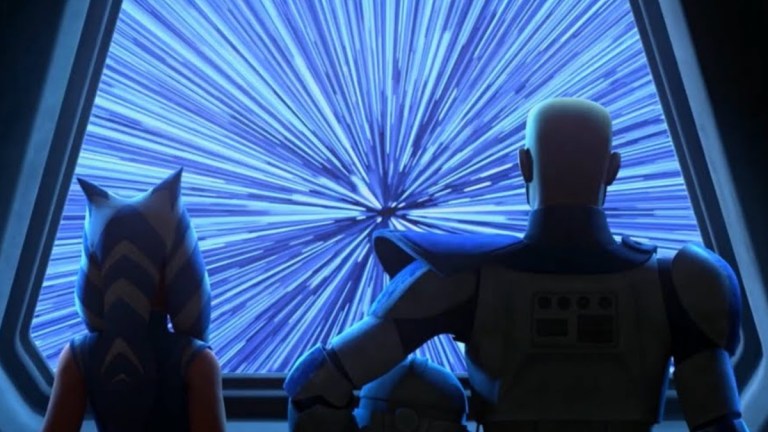How Star Wars: The Clone Wars’ Music Completely Evolved in “Shattered”
The Kevin Kiner score for The Clone Wars season 7 episode "Shattered" will give you chills. Come for the Revenge of the Sith John Williams remix, stay for the freaky synthesizer.

If you got chills while watching “Shattered,” the third part of The Clone Wars finale, there’s a good chance that the episode’s music had something to do with that. Series composer Kevin Kiner’s bold score for this installment is unorthodox as hell but classic at the same time. But, beyond its dichotomy, it proves something about Star Wars in general. Subverting our expectations for what the music of Star Wars should be is, perhaps, the fastest way to make new Star Wars stories feel fresh. We all love John Williams’ scores, but at a certain point, it’s nice to hear something new.
Some might say Star Wars would be nothing without its famous music, but it’s worth thinking about which aspects of the saga would be more well-liked had the music been more memorable and daring. For my money, Solo isn’t half as bad as some of its critics say, but I bet even its biggest detractors would have liked it 20 percent more had the score been a little riskier. Instead of John Powell’s valiant attempt to play the hits, what if Solo had sounded more like Ludwig Göransson’s score for The Mandalorian? Not exactly like The Mandalorian mind you, but a little more metal than what we got.
To be clear, the Solo score has its fans, but there’s a track called “Reminiscence Therapy,” which, let’s face it, is just a very convincing mash-up of two big Williams numbers that scream chase sequence: “The Asteroid Field” from The Empire Strikes Back and “Ben’s Death and TIE Fighter Attack” from A New Hope. The point is, even when the music is pleasant, you can go too far into the territory of nostalgia and overt reference.
In the Sequel Trilogy, and yes, other parts of The Clone Wars, you’ll hear “The Force Theme” (technically, “Binary Sunset”) too many times in too many different contexts. You need it in The Rise of Skywalker when Rey defeats the Emperor in the track “The Force Will Be With You,” but if I never hear that famous theme on The Clone Wars or in any new Star Wars thing, ever, I’ll be fine with that.
Stream your Star Wars favorites on Disney+ with a FREE TRIAL, on us!
Until season 7 of The Clone Wars, I never actually realized how great Kiner’s scores can be when he’s not just remixing those familiar Star Wars go-tos. In “Shattered,” the unnerving use of what sounds like a synthesizer’s long, sonorous notes feels more like Hans Zimmer and Benjamin Wallfisch’s moody score for Blade Runner 2049, than anything from a galaxy far, far away. Unlike the Western swagger of Göransson’s Mandalorian music, the score for the newest Clone Wars is, at times, like cyberpunk mixed with that funky blaster-beam V’ger action from Jerry Goldsmith’s Star Trek: The Motion Picture score, specifically, shades of a track called “The Cloud.”
But, even though it’s edgy, dark, and weird, Kiner’s score for The Clone Wars finale is also notable because it digs deep into some Williams material we don’t readily associate with the show. Revenge of the Sith is many things, but to say it has a lazy score would be untrue. Of all the prequel films, Revenge of the Sith has some of the most haunting and experimental Williams compositions in all of Star Wars. If The Empire Strikes Back is Williams’ Revolver, then Revenge of the Sith is The White Album.
In “Shattered,” Kiner mines the deep-cuts of the Revenge of the Sith score but spins some of these themes in really compelling ways. When Order 66 happens to Ahsoka, we get some traces of tracks like “Anakin’s Dark Deeds,” but before that, in the ominous waiting before everything goes to hell, the essence of “Padme’s Ruminations,” and even a bit of “Palpatine’s Teachings,” run through all of those scenes.
This works thematically, but it also works chronologically. At this point in Ahsoka’s journey, the events of Revenge of the Sith are happening concurrently with The Clone Wars. You could argue that, when some of these selections are playing in The Clone Wars, they’re also playing in Revenge of the Sith at the same time. (I’m not suggesting you play the scores at the same time. I’m not insane.)
Williams’ influence aside, Kiner has done something fairly original in “Shattered.” With very rare exceptions, the majority of animated Star Wars, could, on its worst days, sound like it has “trailer music” playing in the background. This isn’t to say it’s offensive or anything, just that its unremarkable, and not super fun to listen to removed from what’s on the screen. For example, I personally, have never been crazy about the not-so-subtle reshuffling of the Star Wars main theme used in the vast majority of opening credits for The Clone Wars. Thankfully, since part 1 of the finale, “Old Friends Not Forgotten,” that specific version of the main theme has been absent. In a sense, it feels like The Clone Wars finale — and season 7 as a whole — has allowed Kiner to take on Star Wars in a new way, rather than bringing the sound of Williams’ classic music to the animated series.

Going back and listening to Kiner’s score for “Ahsoka’s Walkabout,” the arc that makes up the middle portion of season 7, I realized that some of the darker, moodier music that might be more at home in Westworld has been lurking around for several episodes. The hardcore drama of “Shattered,” made the riskiness of Kiner’s approach seem more apparent, but if you listen to some of his stuff from episodes 7 and 8 from this season, the music resembles something closer to Battlestar Galactica‘s grittier tone.
I’m not saying Kiner’s season 7 score sounds like Bear McCreary’s famous music, or that his compositions in “Shattered” are exactly like Blade Runner 2049 either. It’s definitely Star Wars music you’re hearing in these final episodes of The Clone Wars. But, for the first time, I feel like it’s music more specifically made for The Clone Wars. Before this season, I always felt like The Clone Wars sounded like a cover band doing Star Wars hits.
Now that the music is taking bigger risks, the show sounds like something else. Itself.
